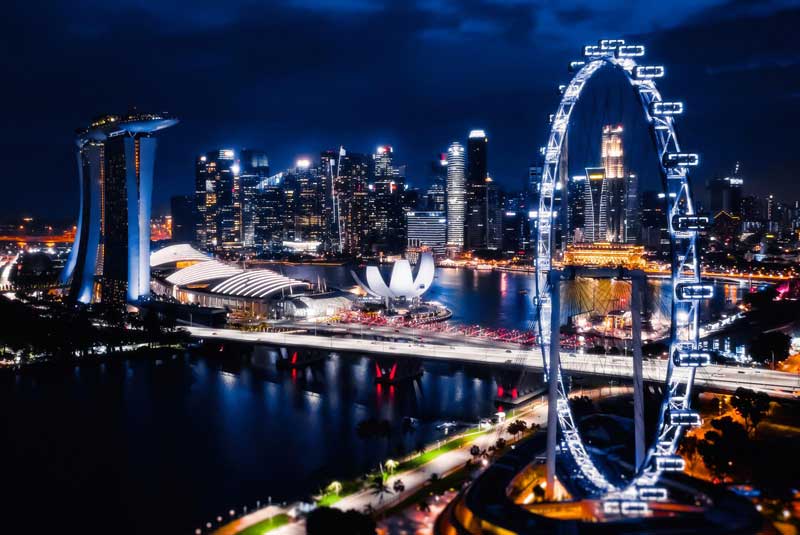Lee Kuan Yew stands as the transformative architect of modern Singapore, whose visionary leadership shaped the destiny of this small island nation. Born into a middle-class family on September 16, 1923, Lee demonstrated exceptional intellect and leadership qualities early on. His journey from the turbulence of the post-World War II era to becoming the prime minister of a globally admired Singapore symbolizes unyielding resilience and keen political acumen.

Early years and education in British Colonial Singapore
Lee Kuan Yew’s formative years were shaped by the echoes of war and the aspirations of a developing nation. With outstanding academic achievement, he secured a scholarship to study law at the University of Cambridge. This period was crucial as it sharpened his legal skills and deepened his appreciation of governance’s role in society. Upon returning to Singapore, he carried the seeds of change, preparing the ground for Singapore’s emergence as a modern nation.
Political awakening and founding of the People’s Action Party
In the 1950s, during growing anti-colonial sentiments, Lee co-founded the People’s Action Party (PAP) in 1954 to address social and economic challenges affecting Singapore. The PAP’s establishment marked the beginning of Lee’s political path, closely intertwined with Singapore’s quest for self-determination. When Singapore achieved self-government in 1959, Lee became prime minister, ready to lead the island into a new era.
Struggle for independence and nation-building
The road to independence was fraught with complexity. The forced merger with Malaysia in 1963 led to political and ideological conflicts, resulting in Singapore’s separation and the birth of an independent republic in 1965. Despite skepticism, Lee’s steadfast determination laid the foundation for a resilient sovereign nation. His tenure was marked by a tireless focus on tackling urgent issues such as unemployment, housing shortages, and social unrest through pragmatic policies.
Building Singapore’s foundation through pragmatic policies
To address housing concerns, Lee established the Housing and Development Board (HDB), ensuring affordable homes for citizens. At the same time, ambitious industrialization plans fueled economic growth. Lee’s leadership steered Singapore away from uncertainty toward becoming an economically vibrant and globally respected nation.
Challenges, controversies, and justifications
Lee’s leadership style faced criticism, especially regarding limited political freedoms. The forced separation from Malaysia highlighted sovereignty challenges, and detractors questioned the stringent measures he imposed. However, Lee justified these as necessary to maintain order and drive rapid development. Despite controversies, Singapore’s stability and economic success under his rule became a model for developing nations worldwide.
Economic miracle and transformation in the 1970s and 1980s
During the 1970s and 1980s, Lee implemented visionary economic policies that transformed Singapore into an economic powerhouse. Embracing free-market principles attracted foreign investment, while initiatives like the Jurong Industrial Estate and the Economic Development Board diversified the economy and created jobs. Singapore’s economic miracle under Lee’s stewardship inspired many other countries.
Commitment to social harmony and meritocracy
Lee’s governance stressed social harmony in Singapore’s ethnically diverse society. Instead of division, cultural diversity became a source of strength. Policies promoting racial and religious harmony created a cohesive society. An emphasis on meritocracy ensured that talent, regardless of background, could contribute to national progress, reinforcing governance based on ability and fairness.
Balancing authoritarianism and democracy for stability
While often critiqued for authoritarian tendencies, Lee argued that strict measures were essential for stability and progress. This pragmatic governance model balanced order with limited freedoms, effectively steering Singapore toward prosperity. Though political dissent was constrained, the country’s trajectory under Lee demonstrated the success of this unique approach.
Legacy and global influence beyond Singapore
In 1990, Lee stepped down as prime minister but continued to influence Singapore’s development as a mentor and elder statesman. His counsel was sought by international leaders, establishing him as a revered global statesman. The “Singapore Model” of economic success coupled with social harmony and effective governance became a blueprint for emerging nations.
Vision for the future and enduring leadership philosophy
Lee Kuan Yew envisioned Singapore’s future as one of continued discipline, hard work, and unity. He cautioned against soft policies, urging citizens to be determined and resilient to avoid mistakes. His belief that the nation’s destiny depends on its people’s dedication remains a guiding light. Lee’s legacy lives on in Singapore’s thriving economy, harmonious society, and remarkable skyline, showcasing the profound impact of visionary leadership.
Lee Kuan Yew’s journey from colonial Singapore to modern metropolis stands as a powerful testament to the impact of steadfast leadership. His visionary leadership shaping modern Singapore future is reflected in the island’s economic transformation, social cohesion, and global recognition as an innovation-driven society. Singapore’s ongoing success and resilience continue to echo Lee’s enduring influence.
